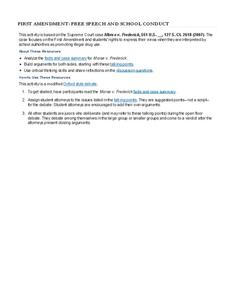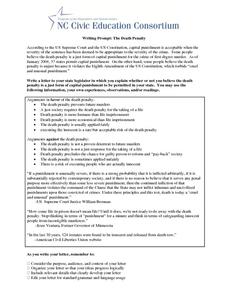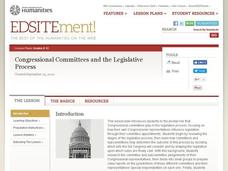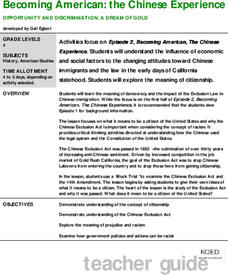Judicial Learning Center
Why Study Landmark Cases?
Why study landmark Supreme court cases? A helpful lesson offers a brief but valuable argument for the importance of these cases in the field of criminology. It introduces scholars to some key terms necessary for studying court cases and...
National Constitution Center
Separation of Powers
Learners explore how the Constitution provides for separation of power and limited government, as evidenced by the three branches of government. They participate in role-playing situations, group discussions, and complete worksheets to...
Curated OER
The Constitution and Governance
Students explore the facets of constitutional government. As a class, they read and discuss the origin and principles of constitutional government. Working in small groups students evaluate the formation of government using examples from...
Curated OER
The constitution and The Bill of Rights
Students explore an Internet site that introduces the Framers, court cases, the Constitution and the Bill of Rights and even games and quizzes.
Curated OER
Constitution Web-lesson
Students examine multiple sources like america's founders, court cases, headilnes and more to learn about the Constitutional Convention of 1787
Curated OER
For The Sake Of Security: U.S.A. Patriot Act & Bill of Rights
A substantive New York Times article about the U.S.A. Patriot Act, military tribunals, racial profiling, and the Bill of Rights forms the basis for a discussion of the complex interplay of fundamental American rights and the aftermath of...
Administrative Office of the US Courts
Morse v. Frederick
If you stop a student from expressing views that advocate drug use, are you violating their right to free speech? Use the 2007 Supreme Court case Morse v. Frederick to discuss a nuanced interpretation of the First Amendment....
Curated OER
Jimmy Carter: Civic Action, Lesson 2
Build on high schoolers' awareness of what's wrong with society. Here they examine Jimmy Carter's extensive involvement in volunteer action in the local, national, and global arenas. Define and explore concepts -- philanthropy, citizen,...
National Woman's History Museum
Women's Suffrage Movement
The National Women's History Museum offers a 20-slide presentation that details the history of the Women's Suffrage Movement from its creation in the 1830s through the passage of the Nineteenth Amendment in 1920.
C3 Teachers
Black Genius: How Did Black Genius Help Build American Democracy?
"How did the slavery system undermine the United States' democratic principles?" This question launches a study of how the Preamble to the Declaration of Independence, Article I, Section 2 of the U.S. Constitution, and Article IV,...
Carolina K-12
Writing Prompt: The Death Penalty
Is the death penalty unjust because it violates the Eighth Amendment of the United States Constitution, "cruel and unusual punishment"? Or is it just a form of permissible capital punishment? After weighing arguments for and against the...
State Bar of Texas
Marbury v. Madison
Who has the final say in matters dealing with the rules under the United States Constitution? The case Marbury v. Madison brings to light the issue of judicial review. Learners investigate the Supreme Court's opinion in the case with a...
National Endowment for the Humanities
The Declaration of Independence in Six Parts
Everyone knows that the Declaration of Independence is important, but what does it actually say? Members of American history classes analyze the Founding Fathers' arguments against British tyranny and for a more perfect union with a...
DocsTeach
The 19th Amendment and the Road to Universal Suffrage
Your vote matters! An informative activity focuses on the Nineteenth Amendment and explains how it paved the way for universal voting rights. Young historians analyze several documents and a complete a worksheet, describing the impact of...
Anti-Defamation League
The Road to Brown
As part of the study of segregation in U.S. schools, scholars research and create a timeline of events that led to the historic Supreme Court case, Brown V. Board of Education. Groups research a topic or event that led to the decision,...
iCivics
Mini-Lesson: Executive Orders
Can the President of the United States pass a law all by himself? Scholars investigate the concept of the executive order in regards to the powers of the presidency. They use current issues and events to monitor media bias while also...
Teaching Tolerance
Using Photographs to Teach Social Justice | Confronting Unjust Laws
The right to peacefully assembly to protest injustice is a key element of the First Amendment to the United States Constitution. Class members are asked to analyze two photographs of people confronting what they consider to be unjust...
Curated OER
Congressional Committees and the Legislative Process
Students consider the importance and influence of congressional committees. They research congressional committee assignments, jurisdictions and responsibilities as illustrations of the basic principles of American federalism.
Curated OER
Ohio Statehouse History
Fourth graders examine the history of the Ohio Statehouse and order the major historical events in its development. The lesson traces the development from the time of Ohio's vast wilderness to the house's completion in 1861.
Curated OER
Preserving Democracy
Students read excerpts of the Declaration of Independence and United States Constitution. Using the documents, they identify the ideas of how the government should be run. In groups, they develop a skit that encourages people to be...
Curated OER
Building the State (1781-1797)
In this online interactive history activity, students respond to 9 short answer and essay questions about the vision of the Republicans and the Federalists.
Curated OER
Opportunity and Discrimination, A Dream of Gold
Young scholars focus on what it means to be a citizen of the United States and why the Chinese Exclusion Act is important when considering the concept of racism.
Curated OER
The Bill of Rights
Seventh graders determine why the Bill of Rights was added to the Constitution. For this U.S. government lesson, 7th graders discuss the first 10 amendments and any vocabulary they may be unfamiliar with. Students then read different...
Curated OER
History Biographies
Students explore the life and the contributions of five people from U.S. history in the five lessons of this unit. james Madison, Dolly Madison, Sequoyah, Harriet Tubman, and Clara Barton are presented to students for exploration and...
Other popular searches
- United States Constitution
- United Statesusus Constitution
- The United States Constitution
- Unites States Constitution

























